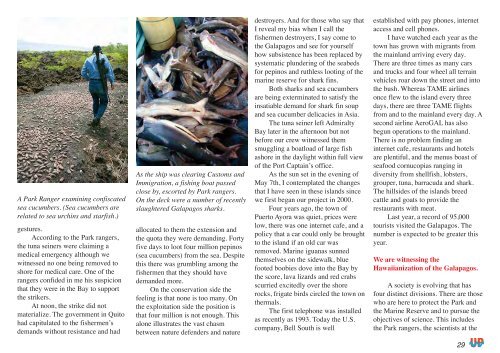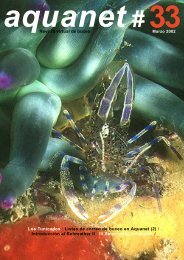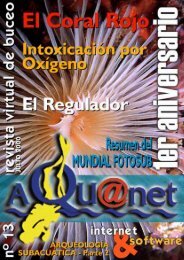Underwater Photography - SENSACIONES.org
Underwater Photography - SENSACIONES.org
Underwater Photography - SENSACIONES.org
You also want an ePaper? Increase the reach of your titles
YUMPU automatically turns print PDFs into web optimized ePapers that Google loves.
A Park Ranger examining confiscated<br />
sea cucumbers. (Sea cucumbers are<br />
related to sea urchins and starfish.)<br />
gestures.<br />
According to the Park rangers,<br />
the tuna seiners were claiming a<br />
medical emergency although we<br />
witnessed no one being removed to<br />
shore for medical care. One of the<br />
rangers confided in me his suspicion<br />
that they were in the Bay to support<br />
the strikers.<br />
At noon, the strike did not<br />
materialize. The government in Quito<br />
had capitulated to the fishermen’s<br />
demands without resistance and had<br />
As the ship was clearing Customs and<br />
Immigration, a fishing boat passed<br />
close by, escorted by Park rangers.<br />
On the deck were a number of recently<br />
slaughtered Galapagos sharks.<br />
allocated to them the extension and<br />
the quota they were demanding. Forty<br />
five days to loot four million pepinos<br />
(sea cucumbers) from the sea. Despite<br />
this there was grumbling among the<br />
fishermen that they should have<br />
demanded more.<br />
On the conservation side the<br />
feeling is that none is too many. On<br />
the exploitation side the position is<br />
that four million is not enough. This<br />
alone illustrates the vast chasm<br />
between nature defenders and nature<br />
destroyers. And for those who say that<br />
I reveal my bias when I call the<br />
fishermen destroyers, I say come to<br />
the Galapagos and see for yourself<br />
how subsistence has been replaced by<br />
systematic plundering of the seabeds<br />
for pepinos and ruthless looting of the<br />
marine reserve for shark fins.<br />
Both sharks and sea cucumbers<br />
are being exterminated to satisfy the<br />
insatiable demand for shark fin soup<br />
and sea cucumber delicacies in Asia.<br />
The tuna seiner left Admiralty<br />
Bay later in the afternoon but not<br />
before our crew witnessed them<br />
smuggling a boatload of large fish<br />
ashore in the daylight within full view<br />
of the Port Captain’s office.<br />
As the sun set in the evening of<br />
May 7th, I contemplated the changes<br />
that I have seen in these islands since<br />
we first began our project in 2000.<br />
Four years ago, the town of<br />
Puerto Ayora was quiet, prices were<br />
low, there was one internet cafe, and a<br />
policy that a car could only be brought<br />
to the island if an old car was<br />
removed. Marine iguanas sunned<br />
themselves on the sidewalk, blue<br />
footed boobies dove into the Bay by<br />
the score, lava lizards and red crabs<br />
scurried excitedly over the shore<br />
rocks, frigate birds circled the town on<br />
thermals.<br />
The first telephone was installed<br />
as recently as 1993. Today the U.S.<br />
company, Bell South is well<br />
established with pay phones, internet<br />
access and cell phones.<br />
I have watched each year as the<br />
town has grown with migrants from<br />
the mainland arriving every day.<br />
There are three times as many cars<br />
and trucks and four wheel all terrain<br />
vehicles roar down the street and into<br />
the bush. Whereas TAME airlines<br />
once flew to the island every three<br />
days, there are three TAME flights<br />
from and to the mainland every day. A<br />
second airline AeroGAL has also<br />
begun operations to the mainland.<br />
There is no problem finding an<br />
internet cafe, restaurants and hotels<br />
are plentiful, and the menus boast of<br />
seafood cornucopias ranging in<br />
diversity from shellfish, lobsters,<br />
grouper, tuna, barracuda and shark.<br />
The hillsides of the islands breed<br />
cattle and goats to provide the<br />
restaurants with meat.<br />
Last year, a record of 95,000<br />
tourists visited the Galapagos. The<br />
number is expected to be greater this<br />
year.<br />
We are witnessing the<br />
Hawaiianization of the Galapagos.<br />
A society is evolving that has<br />
four distinct divisions. There are those<br />
who are here to protect the Park and<br />
the Marine Reserve and to pursue the<br />
objectives of science. This includes<br />
the Park rangers, the scientists at the<br />
29
















